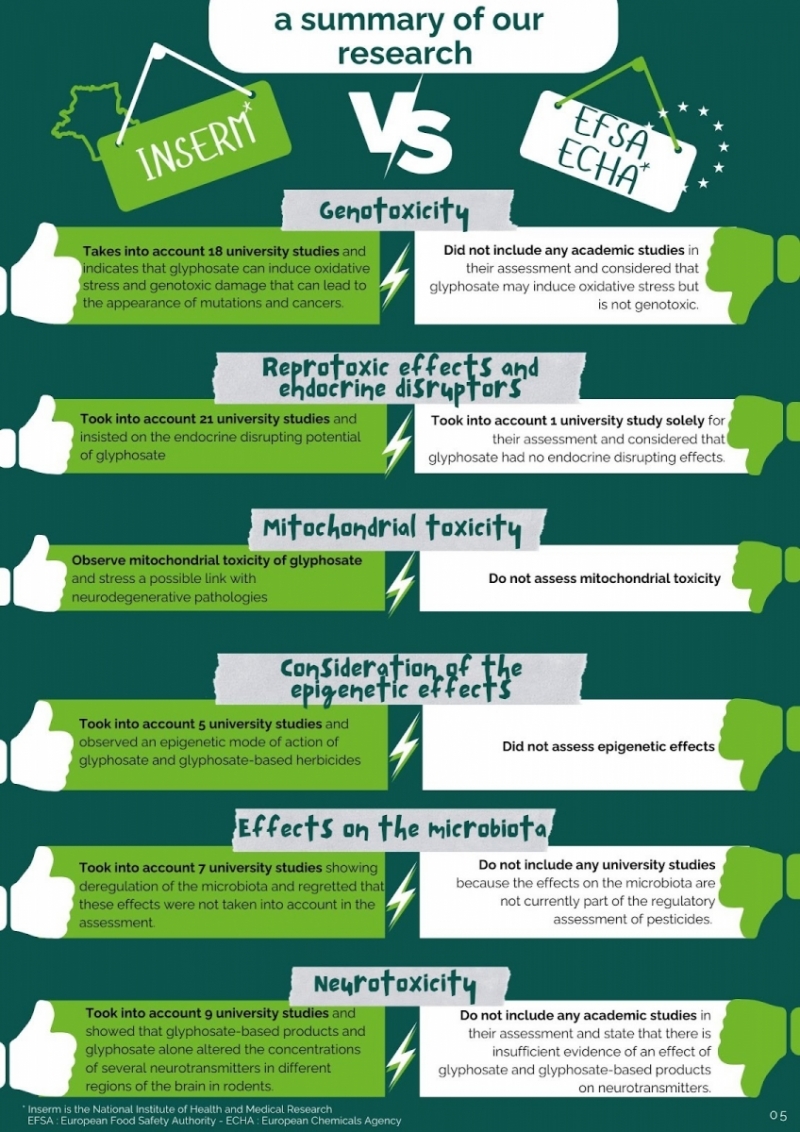The French national health research institute INSERM concluded that glyphosate can have many very negative effects on health. These effects are not recognised by the EU authorities advising on pesticides, which work with outdated and industry-friendly guidelines. An analysis of the differences by our French member Générations Futures gives a clear overview of the origins of the different views and exposes the weaknesses in the EU evaluation. Most independent scientific studies included in the INSERM evaluation are neglected in the EU assessment, which favours studies from the glyphosate producers themselves.
Glyphosate, the world's most widely used herbicide, is the topic of a hot debate. Its EU authorisation expires in December 2023. Despite the many scientific studies on its harmful effects on health and the environment, European institutions are speeding up the decision on its re-approval. The proposal to do so is based on the advice of the European Food Safety Authority EFSA and a piece of earlier advice on carcinogenicity by the Chemical Agency ECHA. The claims that this advice is based on scientific evidence are heavily criticised by top scientific experts in toxicology, cancer, neurotoxicity and biodiversity.
Inserm conclusions
The Générations Futures analysis of the worldwide renowned French public health research institute INSERM explains the different conclusions between regulatory agencies and academic researchers on the toxicity of glyphosate. The EU Agencies have ignored the assessment of certain key effects of glyphosate and almost systematically failed to take into account the solid academic studies cited by Inserm when assessing the weight of scientific evidence. As a result, the agencies' conclusions contradict Inserm's observations on several key aspects of glyphosate's toxicity, concludes Générations Futures. Below their summary of key differences.
| INSERM | EFSA and ECHA | |
| Genotoxicity | Takes into account 18 university studies and indicates that glyphosate can induce oxidative stress and genotoxic damage that can lead to the appearance of mutations and cancers. | Did not include any academic studies in their assessment and considered that glyphosate may induce oxidative stress but is not genotoxic. |
| Reproductive effects and endocrine disruptors | Took into account 21 university studies and insisted on the endocrine-disrupting potential of glyphosate. | Took into account 1 university study solely for their assessment and considered that glyphosate had no endocrine-disrupting effects. |
|
Mitochondrial toxicity |
Observe mitochondrial toxicity of glyphosate and stress possible link with neurodegenerative pathologies. | Does not assess mitochondrial toxicity. |
| Epigenetic effects (changes that can affect next generations) | Took into account 5 university studies and observed an epigenetic mode of action of glyphosate and glyphosate-based herbicides. | Does not assess epigenetic toxicity. |
| Effects on microbiota | Took into account 7 university studies showing deregulation of the microbiota and regretted that these effects were not taken into account in the assessment. | Does not include any university studies because the effects on the microbiota are not currently part of the regulatory assessment of pesticides. |
| Neurotoxicity | Took into account 9 university studies and showed that glyphosate-based products and glyphosate alone altered the concentrations of several neurotransmitters in different regions of the brain in rodents. | Does not include any academic studies in their assessment and state that there is insufficient evidence of an effect of glyphosate and glyphosate-based products on neurotransmitters. |
Générations Futures conclusions
"The scandalous way in which the European regulatory agencies ignore certain important effects or more sections of the scientific literature allows them to claim today that glyphosate is harmless to health or the environment", said François Veillerette, spokesperson for Générations Futures and former president of PAN Europe. "The French government must not play along with this charade and must follow the advice of its public medical research. Indeed, INSERM, one of the world's leading scientific bodies, has clearly expressed its differences of opinion with the agencies on a number of essential points concerning glyphosate and human health. Now is the time for Mrs Borne (French prime minister) to 'follow the scientists' advice', because 'you can't compromise with public health!”
The failing EU assessment can be traced back to design flaws in the implementation of European pesticide legislation. An evaluation by the PEST committee of the European Parliament in 2019 led to a series of recommendations for improvement, but so far hardly any of these have been followed up. See for more details on our Pestgate communication.
Read the report comparing the INSERM and EFSA - ECHA results (in French) here.
